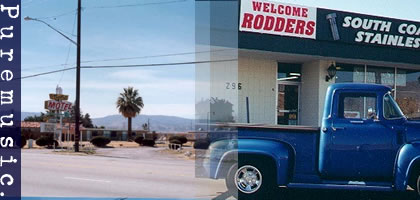
A Conversation with Robert Fisher of WGC (continued)
PM: How has moving back to Beefheartville affected your psyche and your songwriting?
RF: It’s funny that you know that.
PM: I’m a big Beefheart guy.
RF: Yeah. And it’s not only Beefheart, but it’s Zappa too.
PM: Zappa, too, of course, yeah.
RF: Which, just right there alone, tells you enough about the place...
PM: [laughs]
RF: No, it’s interesting. I mean, my family has been here forever. Moving back has kind of--it’s as interesting to see what’s changed as what hasn’t. And in some very real ways, even though I’m only 45 minutes from Hollywood, 60 minutes in traffic, this is a whole different world. This is still American Graffiti out here. There are still car races on Saturday nights, street races, and there are still hot rod shops all over the place. There’s that sort of ’50s, ’60s kind of thing that goes on here.
PM: And the gang element to boot, is there not?
RF: Yeah, there is. And there are meth labs and [laughs] it’s like--
PM: Well, we’ve no shortage of them in Tennessee.
RF: Exactly. But it’s a different place. And it’s the desert. Geography is powerful. And the desert is one of the more powerful kind of geographies you can slide yourself into. It’s high desert, so it has some really unique elements. I mean, 30 minutes away I’m up in the mountains, and it’s absolutely spectacular. And five minutes away I’m in the middle of the Joshua trees. So it’s a very visually powerful thing.
I was talking to a friend about this the other night. It’s sort of like New England in a way, because it’s an environment of extremes. In New England you have the winter, and it’s a very formative thing for people who grew up there and who lived there for any period of time. There’s the reminder that Mother Nature is much more powerful than you ever thought. And here, it’s not dissimilar. It’s a different climate, but even in the wintertime we have--right now it’s 70 degrees during the day and 10 degrees at night.
PM: Wow!
RF: You have these huge swings. And in the summertime, it may get to 115 during the daytime, but by the time five o’clock or six o’clock rolls around and the breezes come through, it’s dropped down to 50 or 60. It’s got these huge extremes. And I think that forms people. There’s an independence in people who live in places like that, who choose to live there.
PM: Are there things musically or otherwise that you’d like to try that you’ve not yet attempted?
RF: [laughs] Yeah, we don’t have enough time--
PM: [laughs]
RF: --to go into that. But yeah, absolutely. I mean, the whole thing is a journey at getting better at exploring other ideas. It’s not about making the same record over and over again, or making the same kind of music over and over again. It’s about expanding and making sure that you challenge yourself on a regular basis.
So yeah, there are all kinds of things. Right now, actually, there’s a guy, his name is Malcolm Lindsey, he’s a Scottish guitar player and string arranger. And he and I are tossing some ideas back and forth about working together. I’d really like to do a record with a string quartet, with only very, very simple instrumentation beyond that, like maybe one or two instruments beyond the string quartet--acoustic guitar and piano or acoustic guitar and trumpet or something like that, and keep it extremely pared down. So that’s something I’d like to fool around with. I’m not a trained musician, so the way I approach things, it’s kind of like directing a movie. My role is to have the vision and put people together and make them comfortable in that environment so that they’re creative, and the collaboration happens out of that. So maybe we’ll pull that one off.
PM: Well, I can understand, Robert, how you can have this ever revolving and ever evolving group of people that is the Willard Grant Conspiracy, and how you can make them comfortable so that they can create, because I’ve found this a very enjoyable conversation. You have a welcoming gift.
RF: Well, that’s really nice of you to say. I hope that’s true. I like to think that the experience of playing in the band and listening to the band is an inclusive one. I mean, to me, music should be inclusive and not exclusive. And that’s whether you’re on the playing side of it or on the listening side of it. When we put in our records, "If somebody tells you they played on this, they probably did," it’s partly a joke, but it’s also serious. It extends to the audience. Everybody is a participant, and that’s important to me. So thank you, that’s a nice compliment.
PM: It’s a visionary idea, and I really appreciate it. And we thank you for your time today.
RF: Thank you. I’ll look forward to seeing you in Nashville at some point.
PM: Well, good. You’d be most welcome in my home, if I might ever open it to you. And I look forward to sitting down with some guitars and rolling a few songs out.
RF: Oh, that’d be great. That’d be great fun.
![]()
|
|||||||
| print (pdf) | |||||||
| listen to clips | |||||||
| wgc online | |||||||
| kimcheerecords.com | |||||||
| loosemusic.com | |||||||
| glitterhouse.com | |||||||
| photographers: | |||||||
| laurent orseau | |||||||
| steffen paulus | |||||||
| charles m. pickett | |||||||
| nicole weingart | |||||||
| puremusic home | |||||||